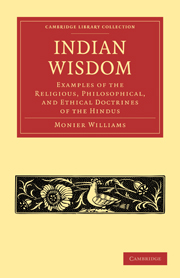Book contents
- Frontmatter
- PREFACE
- THE INDO-ROMANIC ALPHABET WITH THE EQUIVALENT SANSKṚIT LETTERS AND RULES FOR PRONUNCIATION
- Contents
- INTRODUCTION
- LECTURE I The Hymns of the Veda
- LECTURE II The Brāhmana Portion of the Veda
- LECTURE III The Systems of Philosophy
- LECTURE IV The Nyāya System of Philosophy
- LECTURE V The Sānkhya System of Philosophy
- LECTURE VI The Mimāṉsā System of Philosophy
- LECTURE VII Irregular Systems and Eclectic School
- LECTURE VIII Smṛiti. The Vedāngas
- LECTURE IX Smārta-sūtra. Gṛihya, ‘domestic rules’
- LECTURE X The Law-books. Mainu continued
- LECTURE XI Metrical Version of some of Manu's Moral and Religious Precepts
- LECTURE XII The Epic Poems
- LECTURE XIII The Mahā-bhārata
- LECTURE XIV The Epic Poems compared together and with Homer
- LECTURE XV The Artificial Poems
- INDEX
- ADDITIONS AND CORRECTIONS
- ORIENTAL WORKS
LECTURE V - The Sānkhya System of Philosophy
Published online by Cambridge University Press: 29 August 2010
- Frontmatter
- PREFACE
- THE INDO-ROMANIC ALPHABET WITH THE EQUIVALENT SANSKṚIT LETTERS AND RULES FOR PRONUNCIATION
- Contents
- INTRODUCTION
- LECTURE I The Hymns of the Veda
- LECTURE II The Brāhmana Portion of the Veda
- LECTURE III The Systems of Philosophy
- LECTURE IV The Nyāya System of Philosophy
- LECTURE V The Sānkhya System of Philosophy
- LECTURE VI The Mimāṉsā System of Philosophy
- LECTURE VII Irregular Systems and Eclectic School
- LECTURE VIII Smṛiti. The Vedāngas
- LECTURE IX Smārta-sūtra. Gṛihya, ‘domestic rules’
- LECTURE X The Law-books. Mainu continued
- LECTURE XI Metrical Version of some of Manu's Moral and Religious Precepts
- LECTURE XII The Epic Poems
- LECTURE XIII The Mahā-bhārata
- LECTURE XIV The Epic Poems compared together and with Homer
- LECTURE XV The Artificial Poems
- INDEX
- ADDITIONS AND CORRECTIONS
- ORIENTAL WORKS
Summary
THE Sānkhya philosophy, though possibly prior in date, is generally studied next to the Nyāya, and is more peremptorily and categorically dualistic (dvaitavādin). It utterly repudiates the notion that impure matter can originate from pure spirit, and, of course, denies that anything can be produced out of nothing.
The following are Aphorisms, I. 78, 114–117, propounding its doctrine of evolution, which may not be altogether unworthy of the attention of Darwinians:
There cannot be the production of something out of nothing (nāvastuno vastu-siddhiḥ); that which is not cannot be developed into that which is. The production of what does not already exist (potentially) is impossible, like a horn on a man (nāsad-utpādo nṛi-śṛingavat); because there must of necessity be a material out of which a product is developed; and because everything cannot occur everywhere at all times (sarvatra sarvadā sarvāsambhavāt); and because anything possible must be produced from something competent to produce it.
‘Thus,’ remarks a commentator, ‘curds come from milk, not water. A potter produces a jar from clay, not from cloth. Production is only manifestation of what previously existed.’ Aphorism 121 adds, ‘Destruction is a resolution of anything into its cause.’
In the Sānkhya, therefore, instead of an analytical inquiry into the universe as actually existing, arranged under topics and categories, we have a synthetical system propounded, starting from an original primordial tattva or ‘eternally existing essence,’ called Prakṛiti (a word meaning ‘that which evolves or produces everything else’).
- Type
- Chapter
- Information
- Indian WisdomExamples of the Religious, Philosophical, and Ethical Doctrines of the Hindus, pp. 89 - 107Publisher: Cambridge University PressPrint publication year: 2010First published in: 1875

